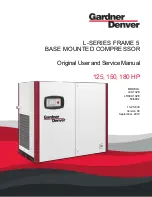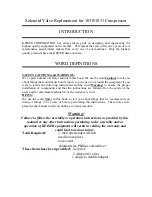
18
E
NGL
IS
H
INSTALLATION AND OPERATION
SPECIFICATIONS
FUNCTIONAL DESCRIPTION
Figure 1 & 2 names the major components of the ACP126
A
Drain Value
B
Regulator
C
Air Filter Kit
D
Oil Breather Cap
E
Oil Sight Gauge
F
Automatic ON/OFF switch
G
Safety valve
H
Pressure Gauge
Your new air compressor can be used for operating paint, weed killer, and
insecticide sprayers, air tools, grease & caulking guns, sandblasters, inflation tools,
etc. A tool with a higher air demand than this compressor can produce may
either not function, or not function well. It may also cause the compressor to run
without stopping for long periods of time, trying to maintain pressure in the tank.
This can cause either the motor or compressor pump to overheat and damage
them. Be sure the requirements of your tools can be met by the compressor.
To compress air, the piston in the pump moves up and down in the cylinder.
On the down stroke, air is drawn in through the inlet valve. Since the
discharge valve remains closed, as the piston goes up, the air in the cylinder is
compressed. The inlet valve closes and compressed air is forced out into the
air receiver. A check valve prevents it from going back into the pump. Working
air is not immediately available. The pump continues to build air pressure until it
reaches the required level on the regulator.
INSTALLATION AND LOCATION
Locate the compressor in a clean, dry and well-ventilated area,
on a firm
level surface. It should be located 12” to 18” (30 to 45 cm) from a wall or any
other obstruction that would interfere with the air flo
w. It is equiped with heat
dissipation vanes that allow for proper cooling. Keep them and other parts free
of dust or dirt that could interfere with cooling. A clean compressor runs cooler
and provides longer service. Do not place anything on top of the compressor.
4.2 Gal. Oil-lubricated Compressor
Voltage: 120 volts AC, 60 Hz
Current rating: 10 amp
No-load speed: 3,450 RPM
Air delivery: 3.1 CFM @ 90 PSI; 4.2 CFM @ 40 PSI
Max pressure: 125 PSI
C
D
E
fig.1
B
A
fig.2
F
H
G






































